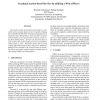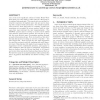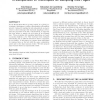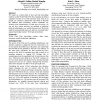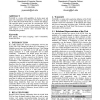SAINT
2008
IEEE
14 years 5 months ago
2008
IEEE
We present an open, decentralized, participatory system which realizes location-based services by gently extending the existing World Wide Web. Utilizing a geospatial search engin...
W4A
2009
ACM
14 years 6 months ago
2009
ACM
One of the most significant advances behind World Wide Web (Web) 2.0 is the ability to allow parts of a Web page to be updated independently. This can provide an exciting, intera...
WEBI
2009
Springer
14 years 6 months ago
2009
Springer
The World Wide Web has transformed into an environment where users both produce and consume information. In order to judge the validity of information, it is important to know how...
STACS
2009
Springer
14 years 6 months ago
2009
Springer
As the World Wide Web is growing rapidly, it is getting increasingly challenging to gather representative information about it. Instead of crawling the web exhaustively one has to...
WSDM
2010
ACM
14 years 6 months ago
2010
ACM
Presence of duplicate documents in the World Wide Web adversely affects crawling, indexing and relevance, which are the core building blocks of web search. In this paper, we pres...
OSDI
2004
ACM
14 years 11 months ago
2004
ACM
As dependence on the World Wide Web continues to grow, so does the need for businesses to have quantitative measures of the client perceived response times of their Web services. ...
CHI
2002
ACM
14 years 11 months ago
2002
ACM
We report on a diary study of how and why knowledge workers use the World Wide Web. By examining in detail a complete two-day set of Web activities from each of 24 people, we cons...
KDD
2002
ACM
14 years 12 months ago
2002
ACM
The rapid growth of the world wide web had made the problem of topic speci c resource discovery an important one in recent years. In this problem, it is desired to nd web pages wh...
WWW
2001
ACM
15 years 3 days ago
2001
ACM
WebLQM is a system with capabilities to locate, query and mine web communities on the Internet. WebLQM has a special way to define the World Wide Web, its contents and relations. ...
WWW
2003
ACM
15 years 3 days ago
2003
ACM
Links are one of the most important means for navigation in the World Wide Web. However, the visualization of and the interaction with Web links have been scarcely explored, altho...
